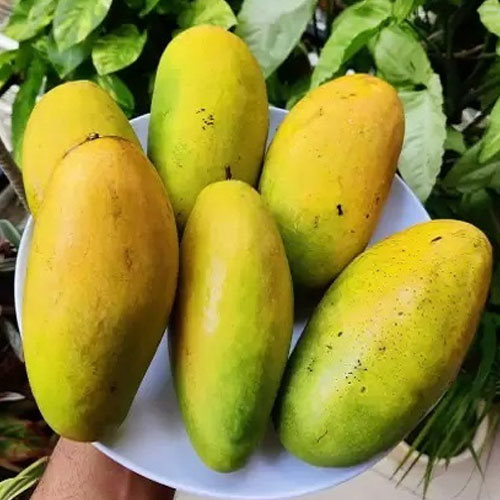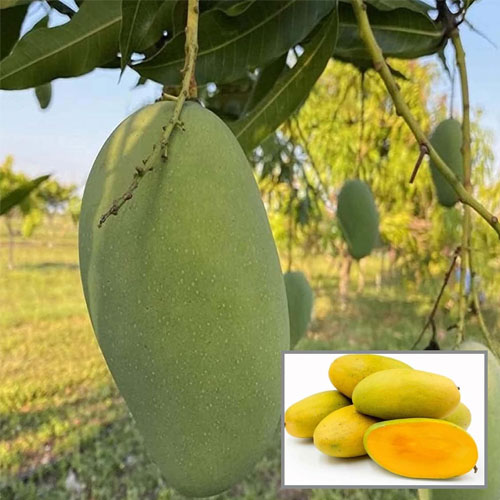Bring home the legendary Dasheri Mango Grafted Live Plant, a heritage variety that originated in the 18th century from a village near Malihabad, Uttar Pradesh. Known as the pride of North India, Dasheri mango is famous for its fragrant aroma, fiberless pulp, and exceptionally sweet taste. This grafted variety ensures early fruiting, consistent quality, and high yield—ideal for both home gardens and professional orchards.
With its luscious golden-yellow skin, juicy flesh, and distinct fragrance, Dasheri mango is loved across India, Nepal, and Pakistan. Whether planted in a pot or ground, this variety adapts well and thrives with minimal care. Now you can grow this historic mango cultivar in your own space and enjoy farm-fresh fruits during every summer harvest.
Variety Name: Dasheri Mango (Malihabadi Dasheri)
Type of Plant: Grafted Live Fruit Plant
Germination Time: 10–15 days (for new growth)
Sunlight Requirements: Full Sunlight (6–8 hours/day)
Growing Locations: Terrace, garden, or open farmland
Growing Season: All Year Round (except heavy monsoon)
Planting Depth: Keep graft union above soil surface
Ideal Climate: Tropical to Subtropical
Plant Height on Delivery: 1.5 to 2 Feet
Fertilizer Requirement: Organic compost, bone meal, or NPK 6:6:6
Life Span: 40–60 years (with proper care)
Ideal Growing Temperature: 24°C to 36°C
Harvesting Time: May to July (fruits in 2–3 years)
Maintenance Required: Low
Watering Frequency: Twice a week or as per soil moisture
Ideal Grow Bag Size: Minimum 24x24 inch for pot cultivation


Dasheri mango can be planted year-round, but February to April and August to October are ideal for best root establishment. The tree starts fruiting from May to July, offering a delightful summer harvest. With its origin in Malihabad, UP, it is well-suited for the Indian subcontinent and adapts beautifully to various regional climates.
Use a 24x24 inch HDPE grow bag or large cement/clay pot. Fill with fertile red or loamy soil mixed with compost. Ensure the pot has proper drainage holes. Water thoroughly after planting and place the plant in an area with full sun. Prune occasionally to shape the tree and encourage bushy growth.
Preparation: Choose a large grow bag or sunny outdoor space.
Planting: Dig a hole twice the size of the root ball; plant carefully, keeping the graft line above soil.
Watering: Water immediately after planting and maintain moisture without overwatering.
Germination: Not applicable; this is a live grafted plant.
Transplanting: Once it outgrows the pot, move to a larger container or plant in soil.
Sunlight: Requires full sun exposure
Soil: Rich, well-drained loamy soil
Fertilization: Apply compost, cow dung, or mango-special fertilizers every 4 months
Pruning: Remove dry or weak branches once a year
Support & Spacing: Provide 15 feet spacing if planted in soil
Pest Control: Use neem oil or herbal pesticides for common pests
Disease Prevention: Ensure dry leaf surfaces; avoid water logging
Mulching: Retains moisture and improves root health
Harvesting: Pick when the fruit turns golden yellow with a sweet smell
1. Apply Nutrient-Rich Fertilizers
When your plants begin flowering, use nutrient-rich fertilizers like Organic Bone Meal Powder or Vermicompost. This helps in boosting the bloom and enhances overall yield.
2. Use Organic Fertilizers
Feed your plants with organic fertilizers such as Cow Dung Manure or Neem Cake. Organic options promote healthy soil life.
3. Regular Feeding
Apply fertilizers every 20-25 days to ensure plants receive a steady supply of nutrients. Choose from various options like Cocopeat Compost for moisture retention.
Dasheri mango trees are fast-growing, early-yielding, and boast high adaptability across Indian climates. The mango is medium-sized, elongated, and smooth with minimal fiber. It offers a sweet, honeyed flavor with unmatched fragrance. Originating from the mango capital Malihabad, this variety holds historical and cultural importance. Its fruits are loved for both table consumption and juice-making.
Rich in Vitamin A and C
Great for smoothies, desserts, and fresh eating
High market value due to premium taste
Adds tropical appeal to gardens
Grows well in terrace gardens and backyards
Avoid waterlogging; use soil with good drainage
Do not bury the graft point
Protect from strong winds during the first 6 months
Fertilize timely for good fruit development
Watch out for leafhopper or scale pests in summer
No flowering: May need more sunlight or phosphorus-rich fertilizer
Yellow leaves: Due to overwatering or poor soil drainage
Fruit drop: Caused by nutrient imbalance or water stress
Leaf spots: Spray with neem oil and avoid overhead watering
Dasheri Aam, Malihabadi Dasheri, Dussehri Mango, Dassehri Maambazham, Daseri Mamidi, Dasehri Mango Tree, Daseri Maanga
Q1: When will the Dasheri plant start fruiting?
Usually within 2 to 3 years after planting.
Q2: Is this a grafted mango plant?
Yes, it is a grafted Dasheri mango, ideal for faster fruiting and better yield.
Q3: Can I grow it in a terrace pot?
Yes, choose a large grow bag with full sun.
Q4: What makes Dasheri mango unique?
Its strong aroma, syrupy sweetness, and fiberless texture.
Sign in now to receive a 5% instant discount on your first order when using code WELCOME. Begin your organic journey today!
By logging in, you're agreeing to our Terms of Service and Privacy Policy.
Chirag
Bahut accha experience raha, plant bilkul fresh tha.
Bhavana
Bahut premium quality ka Dasheri mango plant mila.
Tanvi
Plant transplant karte hi growth visible thi.
Rohit
Golden Hills Farm ke grafted mango plants sabse reliable hote hain.
Aarav
Bahut khush hu, plant ekdum healthy aur green condition me mila.
Gaurav
Bahut accha result mila, leaves lush green aur healthy hain.
Komal
Golden Hills Farm se hamesha premium quality mango plants milte hain.
Fatima
Healthy aur pest-free plant deliver hua, roots strong aur moist the.
Lalita
Bahut sweet aur aromatic Dasheri variety hai, sabko pasand aayi.
Sneha
Dasheri Mango Grafted Live Plant healthy aur fresh condition me deliver hua.